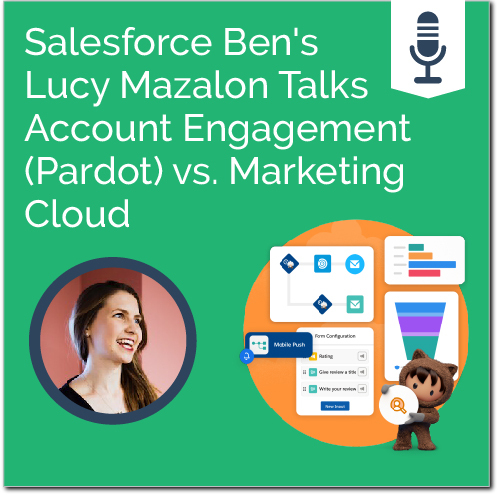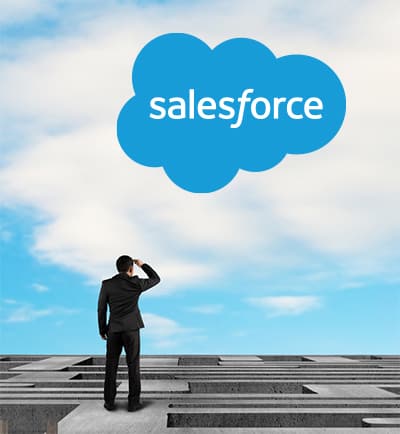Salesforce Ben’s Lucy Mazalon Talks Account Engagement (Pardot) vs. Marketing Cloud
Episode Notes/Resources:
In this episode of Salesforce Simplified we’re talking with Salesforce Ben’s Operations Director, Lucy Mazalon, about the differences between Salesforce’s Account Engagement (Pardot) and Marketing Cloud.
The reason we’ve called on Lucy for this topic is that she is an 11x certified Marketing Champion and the founder of The DRIP, Salesforce Ben’s sister blog for marketing professionals.
Resources:
Subscribe to The DRIP Newsletter
Transcription:
Mike Boyle: Hi everyone. In this episode of Salesforce Simplified, we’re going to be talking with Salesforce Ben’s Operations Director, Lucy Mazalon. Hi everyone, Mike Boyle from Ad Victoriam Solutions. And we’re going to be talking with Lucy about the differences between Salesforce’s Pardot and Salesforce’s Marketing Cloud. Now the reason we’ve called on Lucy for this topic is that she is now an 11x certified Marketing Champion and founder of the DRIP, which is Salesforce Ben’s sister blog for marketing professionals. And for those who don’t know, Salesforce Ben – at salesforceben.com – is the leading content producer of the Salesforce world. Lucy, welcome to the Salesforce Simplified podcast. Love having you here.
Lucy Mazalon: Hi Mike, thank you so much for inviting me and hello to all of you listening.
Mike Boyle: So yesterday was an exciting day for you. Yesterday you were 10x certified, today you’re 11x Salesforce certified. You got that Marketing Associate exam. How does that feel to have that one behind you?
Lucy Mazalon: Well, I think the Marketing Associate is an interesting one. It follows a pattern of Salesforce also introducing the associate back in 2022. So yeah, it’s basically giving people who may not want to study for the admin or email specialist, sorry, for the Marketing Cloud, Admin or Marketing Cloud email specialist. It gives you a good feel for the core concepts of marketing cloud, but also just like generally how to be a better marketer.
Mike Boyle: Well, congratulations on that and looking forward to changing eleven to twelve. No pressure. Not putting any pressure.
Lucy Mazalon: There is something in the works, but we can talk about that later.
Mike Boyle: Good deal.
All right, so let’s talk a little bit about Pardot and Marketing Cloud. Can you give me a high-level overview of the architecture of how they fit into the Salesforce ecosystem individually – Pardot and Marketing Cloud…
Lucy Mazalon: Yeah, of course. So, I did write a kind of like history of Marketing Cloud. So, I mean I’m not a history buff, so I don’t have the dates cemented in my mind, but I’ll give you roundabout dates. So pretty much Pardot was founded I believe 2012. Then exact Target founded acquired Pardot in 2013. I’m saying that with hesitation because I know people out there will be like, no, it wasn’t 2013. But anyway, so yes, marketing, sorry, exact Target acquired Pardot and then Salesforce acquired Exact Target in 2013. 2014. So, it was like basically a medium sized fish eating a small fish and then the big fish eating the medium sized fish alongside the small fish. I don’t know how else to explain it, but anyway, under one happy family I think both products saw huge traction just being under the Salesforce umbrella. But these products were selected because they do have such a good integration with Salesforce and with the founders, the respective founders, they had considered how can we best integrate with Salesforce? And then Benioff [Salesforce CEO Marc Benioff] and company turned around in 2013, 2014 being like we need a marketing product. So Exact target was the clear choice there.
Mike Boyle: I love the fish analogy. Trust me, I think that’s hilarious.
Pardot and Marketing Cloud, they’re two very powerful marketing automation tools, but let’s talk about what sets them apart. Can you break down the key differences between these platforms for us?
Lucy Mazalon: Sure. Traditionally Pardot – now Account Engagement – was always geared well, was geared towards B2B. So, business to business marketing, that’s when you have a customer that’s interested, but there’s multiple processes, stages in the cycle. It’s a long conversation with multiple influences. It’s not just like B2C – as in business to consumer – where someone just goes oh yeah, I like that pair of shoes, click, buy. So traditionally Pardot was framed as a B2B solution. However, that was then changed to be ah, a considered purchase. So, it doesn’t matter if it’s a business to consumer, business to business, if there’s a considered purchase where it might take weeks, months, even years to market to that person, get their loyalty and then sell. Whereas marketing cloud is very good at the handling the mass transactional purchases.
Mike Boyle: Gotcha… We often hear about businesses using either Pardot or Marketing Cloud, but are there any situations where it makes sense to use both of them? Are there any unique benefits or synergies when combining those platforms?
Lucy Mazalon: I’m laughing. If you have a lot of money, a lot of budget, then you can use both. I think there are companies out there that use both. I know a couple of people in my network that work at companies that use both. I think what the most important point to understand is, first of all, don’t expect someone to be an expert at both of them. Like you’ll have consultants out there that will be able to consult on both or be able to implement or be able to advise. But if you’re talking about an in-house situation like at your company, don’t expect this one person to be the Pardot admin and also the marketing cloud admin because it’s just too much for them to keep up with. Another thing I want to highlight is shoehorning this. because I used to be a consultant, I was a consultant for like five years, mostly on Pardot and Salesforce but the idea of when there’s different price points, a company just going for a cheaper option and then trying to stretch it, trying to push their use case into it where actually they should have gone for the other. That I think is a huge red flag.
Mike Boyle: Lucy, are there any specific industries or sectors where Pardot or Marketing Cloud excels know can be effective across the board?
Lucy Mazalon: Well, I think when it comes to Salesforce marketing products like Account Engagement – aka Pardot – and Marketing Cloud, there’s no industry angle on it. These are pretty industry agnostic. However, like I said, there are some industries that could be primarily B2B. For example, recruitment, legal, and professional services, they’re typically B2B. And then you’ve got things like retail, travel and leisure which are primarily B2C. But that doesn’t mean that you’re saying okay, we’re traveling leisure, you’ve got to go Marketing Cloud. Because like we just said, within those travel and leisure companies you might have a division where they’re targeting consumers en masse, but then they might also have a partner network. I know some companies do this where they need to do the B2B relationships with their partner network on Account Engagement – i.e. Pardot. So yeah, it’s not an easy question to answer, but I’d say overall pretty industry agnostic.


